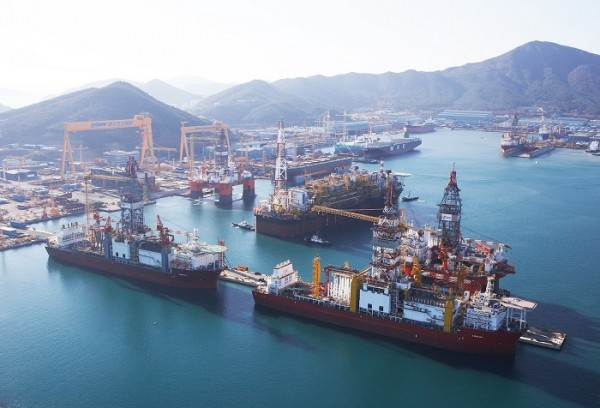Korea pension funds seek damages from Daewoo Shipbuilding’s books rigging
Jul 19, 2016 (Gmt+09:00)
3
Min read
Most Read
LG Chem to sell water filter business to Glenwood PE for $692 million


KT&G eyes overseas M&A after rejecting activist fund's offer


Mirae Asset to be named Korea Post’s core real estate fund operator


StockX in merger talks with Naver’s online reseller Kream


Meritz backs half of ex-manager’s $210 mn hedge fund



The legal action by the two leading pension funds in South Korea came shortly after the National Pension Service (NPS) said on July 14 that it had filed a civil case against the shipbuilder, its former executives and auditor Deloitte Anjin, demanding about 50 billion won ($44 million) in compensation for its investment losses triggered by the company’s fabricated financial statements.
An NPS source told the Korea Economic Daily on July 14: “The size and scope of damages could be expanded, depending on the results of the financial regulator’s scrutiny on Daewoo Shipbuilding’s accounting books, prosecutors’ probe and court ruling.”
Last week South Korean prosecutors indicted Daewoo Shipbuilding & Marine Engineering Co. Ltd. for inflating revenues and profits in the period of 2012 to 2014 by understating costs and losses. The company’s ex-executives were also indicted for negligence of duty and embezzlement.
“It is understood that one to two other pension funds are also considering taking a legal action,” a legal industry source told the Korea Economic Daily. “The total amount of damages to be sought by pension funds could exceed 100 billion won.”
The state-run Korea Post also claimed damages of 400 million won from the troubled shipbuilder in a separate case filed on July 18, Yonhap news reported. The lawsuit was filed in the name of government, according to the report.
The other sources told the Korea Economic Daily that following the news of the civil case brought by the NPS, the equities investment teams of the GEPS and the teachers’ pension fund started calculating losses from their shares in Daewoo Shipbuilding. No further details are available immediately from the two pension funds.
On July 15, the GEPS and the Teachers’ Pension lodged a suit against Daewoo Shipbuilding, former and current executives of the shipbuilder and accounting firm Deloitte Anjin with the Seoul Central District Court via a law firm. The Teachers’ Pension is seeking 14.7 billion won in compensation and the GEPS claims 7.3 billion won, totaling 22 billion won ($19 million), said those sources. In the case, the two pension funds sued ex-CEO of Daewoo Shipbuilding Jae-ho Koh, two former in-house directors and five non-executive directors.
“We relied on the falsified financial reports and audit reports of Daewoo Shipbuilding to buy shares and suffered losses as a result,” the GEPS and the teachers’ pension fund said in the lawsuit.
Prosecutors investigating the accounting fraud of the shipbuilder estimate that its window dressing between 2012 and 2014 amounted to 5.7 trillion won. The state-run Korea Development Bank owns almost half of the shipbuilder’s issued capital.
Legal industry observers see some chances that pension funds may receive damages for part of losses related to the window dressing from Daewoo and its auditing firm, citing a recent ruling made in favor of pension funds in a similar case.
This year PwC Korea has paid a total of 5.7 billion won in compensation to pension funds, banks and other institutions, as well as minority shareholders, who suffered losses from the rigging of a small-sized Korean firm’s books: the pension funds included NPS, Korea Post, Korean Teachers’ Credit Union, the Teachers’ Pension, and GEPS.
Shares in Daewoo Shipbuilding have wiped out more than 80% of its market value over the past two and half a years, against the range-bound broader market, weighed by the dwindling and cancelled ship orders due to the prolonged economic slowdown and its accounting scandal.
By Soram Jung and Daehoon Kim
ram@hankyung.com
Yeonhee Kim edited this article
More to Read
-
 Real estateMirae Asset to be named Korea Post’s core real estate fund operator
Real estateMirae Asset to be named Korea Post’s core real estate fund operatorApr 29, 2025 (Gmt+09:00)
-
 Asset managementMirae Asset bets on China as Korean investors’ US focus draws concern
Asset managementMirae Asset bets on China as Korean investors’ US focus draws concernApr 27, 2025 (Gmt+09:00)
-
 Alternative investmentsMeritz backs half of ex-manager’s $210 mn hedge fund
Alternative investmentsMeritz backs half of ex-manager’s $210 mn hedge fundApr 23, 2025 (Gmt+09:00)
-
 Real estateRitz-Carlton to return to Seoul, tapped by IGIS Asset for landmark project
Real estateRitz-Carlton to return to Seoul, tapped by IGIS Asset for landmark projectApr 22, 2025 (Gmt+09:00)
-
 Real estateS.Korean gaming giant Netmarble eyes headquarters building sale
Real estateS.Korean gaming giant Netmarble eyes headquarters building saleApr 18, 2025 (Gmt+09:00)
Comment 0
LOG IN


